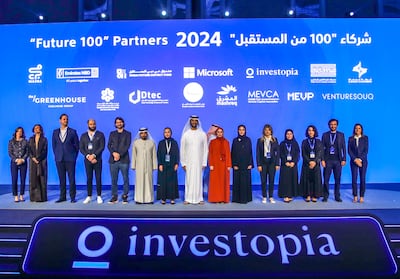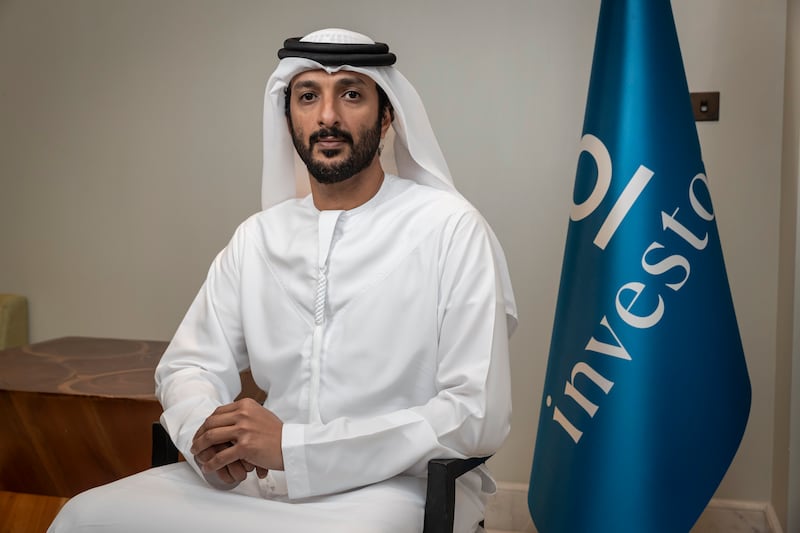The challenges resulting from the conflict in the Red Sea have highlighted the need for new trade routes as well as investments to redesign logistics and ensure stable supply chains, UAE Minister of Economy Abdulla bin Touq has said.
“The challenge of the Red Sea is a challenge for both the UAE and globally,” Mr bin Touq told The National.
“We need to look at new trade routes, new ways of moving items, [ensuring availability of] supply, making sure there's enough supply to the market in the UAE, the region and the world,” he said on the sidelines of the Investopia conference in Abu Dhabi on Thursday.
He said that it would take a bit longer to go back to the normal supply and demand balance.
“There would be investments coming in to make sure there are factories closer to new markets, redesigning supply routes and supply trade globally. That will actually boost the economy forward,” Mr bin Touq said.
Houthi rebels in Yemen began attacking commercial vessels to express solidarity with the Palestinians in the Israel-Gaza war. The Iran-backed group show no signs of retreating despite the US and western allies attempting to deter the group with air strikes.
This has severely disrupted trade routes, resulting in longer transit times and affected the bottom line of shipping companies, which have, in response, raised their rates to cope with losses.
“We need to look at what these circumstances [are and the] new challenges,” Mr bin Touq said.
Despite the global challenges, the UAE remains focused on resilience and policies that are “very dynamic”, he added.
The country's economy is expected to expand by 5 per cent this year, the minister said this week.
The government, in line with its We the UAE 2031 economic strategy, aims to double the nation's gross domestic product to Dh3 trillion ($816.8 billion) by that year.
At Investopia, global executives and politicians reiterated their confidence in the UAE economy, which has weathered several challenges in recent years, including the Covid-19 pandemic, the Russia-Ukraine and Israel-Gaza wars and high inflation and interest rates.
The US Federal Reserve is widely expected to begin scaling down interest rates in 2024, and this will have a significant effect on investor sentiment and economies, Mr bin Touq said.
“If interest rates are scaled down, it will help investors to really put more money in, and there will be a movement of capital that will [boost] investments into new areas and move the economy forward. So we hope that can happen by this year,” he said.
Inflows of foreign direct investment into the UAE are expected to grow further, the minister said. The country posted a record FDI of about $23 billion in 2022; official figures for last year have yet to be released.
The UAE also came in second globally after the US in terms of greenfield FDI last year, “meaning that new investments are coming in new areas that haven't been seen before here in the UAE”, he said.
After the UAE passed a law permitting 100 per cent foreign ownership of companies in 2019, about 75,000 new firms were created in a year and a half, according to Ministry of Economy data.
Between 2021 and 2022, the number of registered companies in the country increased to about 788,000. The ministry has a target of 1 million by the end of 2031.
“That kind of progressive movement in investments will come with economic policies that are set in place by the ministry and the country,” Mr bin Touq said.
“We would like to continue this conversation forward. We had conversations on capital markets, the movement of capital between the traditional economy and markets to new [and] emerging markets. We would have to see more and more happening.”
New economies, he said, are “really taking off”, specifically e-commerce, artificial intelligence, financial technology, health technology and agricultural technology.

“We bring policymakers to make sure that they have a conversation about the new challenges and what kind of new economy comes out of it,” Mr bin Touq said.
In particular, AI – thrust into the spotlight with the emergence of generative AI that led to an industry frenzy – is expected to reel in more investments and drive “huge progressive growth”, he said.
AI has the effect as with any other industrial revolution and “we would like to see more of AI improving effectiveness and efficiency globally”, Mr bin Touq said.







